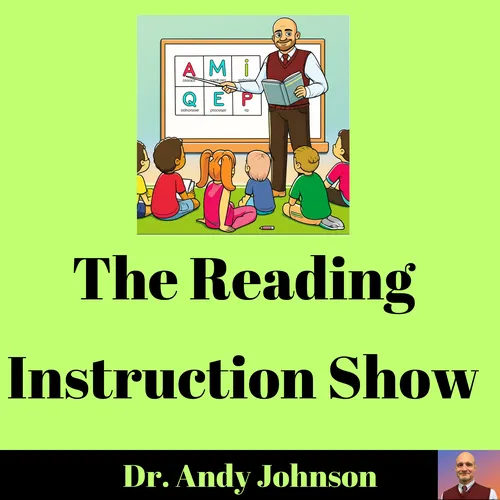
The Reading Instruction Show
The Reading Instruction Show is a podcast about reading instruction (and other things) with a little bit of attitude. There is plenty here to inform and entertain all. And, by the way, I'm not trying to sell any books. I don't have any curriculum or programs to market. I don't accept speaking fees. And, I don't ever want to be a consultant.
- Update frequency
- every 8 days
- Average duration
- 15 minutes
- Episodes
- 295
- Years Active
- 2019 - 2025

The Psycholinguistic Guessing Game
This is what Ken Goodman wrote in 1967:
“Reading is a psycholinguistic guessing game. It involves an interaction between thought and language. Efficient reading does not result from precis…

Whole Language and Evidence-Based Reading Instruction
In 1967, Ken Goodman published an article in Reading Research Quarterly with the title` Reading: A Psycholinguistic Guessing Game (Goodman, 1967). Here he applies Psycholinguistic Theory to the read…

Conversation with Claude Goldenberg
This is a wonderful conversation that I had with Claude Goldenberg. He has different ideas about things but he is a delight to talk with.

The Music of Balaned Literacy Instruction
As said throughout this book: if you are against something, you should at the very least know a little somebody about that which you are against. SoR enthusiasts are often against something that isn…

Whole-to-Part vs. Part-to-Whole Reading Instruction
Structured literacy is based on the idea that people learn complex things best by mastering each little part separately and then putting the parts together to create the whole. This is called part-t…

Ropes, Humpty Dumpty, and Systems Theory
The SoR is based on the simple view of reading (Cervettie, et. al, 2020; Duke & Cartwright, 2021; Hoffman, 2017). According to this theory, skilled reading is a result of decoding and language compr…

Ropes, Humpty Dumpty, and Systems Theory
The SoR is based on the simple view of reading (Cervettie, et. al, 2020; Duke & Cartwright, 2021; Hoffman, 2017). According to this theory, skilled reading is a result of decoding and language compr…

Little Timmy Learns to Read: A True Story
Phonics is important, but if that’s all you’re teaching, you limit students’ ability to recognize words and create meaning with print. And that is the end goal – to create meaning, not to fill out p…

Chilren of the Code: Hard-Wired to Learn Reading
I was having a discussion with a fellow online who insisted that early reading instruction should consist primarily of direct instruction of phonics. His argument was that unlike learning to use ora…

Defining the Science of Reading and SoR Research Standards
If you threw a rock into the middle of a pond but that rock was not a rock, can you still be said to have thrown a rock? Likewise, can a standard be said to be a standard if it is not standardized?
…

Understanding Science, Research, and Research Methods
Basic terms are often misunderstood or misapplied by SoR advocates. My goal in this podcast is to bring a little more clarity to three important and often misunderstood terms: science, research, and …

Dr. Elana Aydarova. Science of Reading Mythologies
Dr. Elena Aydarova is an Assistant Professor in the Department of Educational Policy Studies at the University of Wisconsin-Madison and a fellow with the National Education Policy Center. Dr. Aydarov…

It’s Easier to Blame Teachers than to Fix Problems
If you can blame students, teachers, and colleges of education, we won’t see the social problems that impact learning. It’s much easier to blame teachers than to fix the actual cause of social probl…

The Ample Testimony of Reading
To fully understand this current reading “crisis” (which really isn’t a crisis at all), it must be seen in the context of similar “crises” occurring in the past (which weren’t really crises either). …

Understanding the Limitations of Data and Research in Educational Research
The thing about research is that it doesn’t prove anything, at least not in the social sciences. There is no single research that conclusively proves anything once and for all about reading instructi…

The Reading Crisis the Isn't: Context Matters
Words are always encountered in the context of a sign, product, or sentence. In the same way, to be understood, data must be understood and evaluated in the context in which it was collected. Readi…

Reading Instruction in the Context of Crisis
If you were to consume a lot of popular media today related to education, you would be led to believe that there is a reading crisis. Apparently, it’s all “deeply concerning”. I can’t help but won…

LETRS Does Not Meet Basic SoR Standards
Conclusions
The Science of Reading promotes the exclusionary use of strategies and practices that have been shown to be effective using controlled experimental or quasi-experimental research conducted…

LETRS: Weasels or Engery Efficient Light Bubls
This podcast examines Language Essentials for Teachers of Reading and Special (Lexia) or LETRS. I wanted to find the “reliable, trustworthy, and valid evidence” that “has demonstrated” that LETRS had…